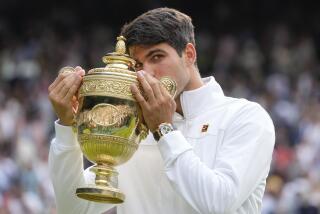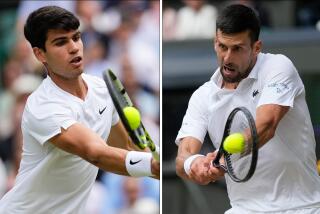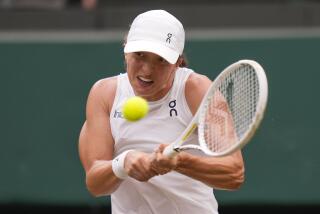Rafael Nadal and Novak Djokovic to meet in Wimbledon men’s final
- Share via
Reporting from Wimbledon, England — It was only one missed shot, a forehand that looked so easy as Andy Murray took aim at the ball, the fourth-seeded Scotsman poised to earn two break points against Wimbledon’s defending champion, Rafael Nadal.
Until he blasted the ball out of bounds.
Nadal held serve in that game, the fourth of the second set. It was the first of seven straight games Nadal won on his way to winning three consecutive sets and his 20th straight match at Wimbledon — all of which he did while breaking Murray’s spirit and heart.
The top-seeded Nadal won, 5-7, 6-2, 6-2, 6-4, Friday in a semifinal, advancing into Sunday’s final, in which he will play second-seeded Novak Djokovic.
Djokovic sparkled in his 7-6 (4), 6-2, 6-7 (9), 6-3 victory over 12th-seeded Jo-Wilfried Tsonga of France, a victory that, win or lose against Nadal, earned him a prize:
No matter what happens Sunday, the 24-year-old Serb will become the top-ranked player in the world Monday.
Djokovic will be playing in his first Wimbledon final. He is 47-1 this year, a match record that includes four wins over Nadal.
“They don’t give you a lot of chances to become No. 1,” Djokovic said. “So I guess you need to lose only one match in seven months to get there. If you can do that, then well done.”
Djokovic earned the chance to bask in his soon-to-be No. 1 status by withstanding a barrage of artistic and athletic points from the 6-foot-2, 200-pound Tsonga.
The Frenchman tumbled and twisted and twirled his body around the court and brought the crowd to its feet in the third-set tiebreaker when he saved two match points.
Tsonga hit so many spectacular shots, including a winning volley while he was sitting on the ground, that he said he would need to watch a recording. Not until he refreshes his memory would he be able to say which shot was his favorite.
In the Murray-Nadal match, it was a relatively routine shot missed by Murray that both players agreed changed the match.
“It was a big point,” said Murray, who has yet to advance past the semifinals at the tournament he most wants to win. “I was playing very high-risk tennis for most of the match. I went for it today and I started to make a few mistakes after that.”
Nadal made few mistakes of any kind. The 25-year-old Spaniard, who won the French Open last month and is bidding for his 11th major title, had seven unforced errors and 37 winners.
“The statistics were unbelievable,” he acknowledged.
Djokovic’s only loss this year came in a French Open semifinal, against Roger Federer. Now he is in the Wimbledon final for the first time.
“I’ve been working all my life for this,” Djokovic said. “I’ve been dreaming about playing the finals of Wimbledon since I started playing tennis when I was 4 years old. To be able to be there on Sunday will probably be the best feeling.”
When Djokovic put a final, decisive service winner in the corner of the box, on the line, he screeched in delight, fell to the grass and kissed the dirt.
During the match, it was Tsonga who was on the ground more often, stretched full out and willing to tumble for winners.
“This is the only surface where you can really dive,” Tsonga said of the grass, “because on the others, if you dive you go directly to the hospital.”
If Djokovic had any worries about Tsonga making a second miraculous comeback — the Frenchman had come from two sets down to upset six-time champion Federer in a quarterfinal — he helped end them by winning eight straight points to start the final set.
Nadal, who won here last year and in 2008 (he didn’t play in 2009), considered his performance against Murray his best of this Wimbledon so far.
“I was playing well at the beginning,” he said. “But probably I improved a little bit each level. Now I probably played my best match this year.”
One more to go.
twitter.com/mepucin
More to Read
Go beyond the scoreboard
Get the latest on L.A.'s teams in the daily Sports Report newsletter.
You may occasionally receive promotional content from the Los Angeles Times.










